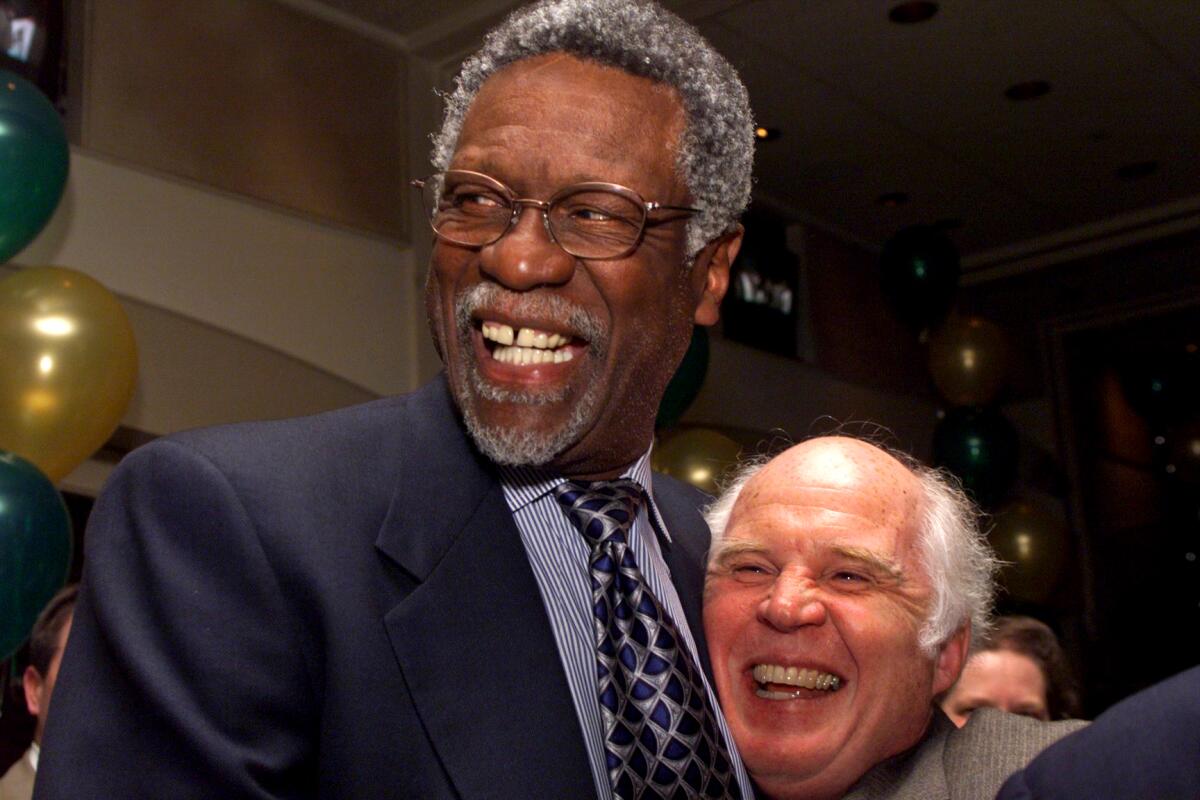Taylor Branch, who co-wrote Bill Russell’s indelible memoir, remembers his friend

- Share via
In 1977, Taylor Branch was a magazine writer and ghostwriter who had just finished working on the biography of Nixon White House Counsel and Watergate figure John Dean. He told his agent he wanted his next subject to be as different from Dean as possible. And that’s how Branch ended up spending nearly a year with Bill Russell in the NBA great’s Seattle home.
The resulting book, “Second Wind: The Memoirs of an Opinionated Man,” predates Branch’s sweeping trilogy of books about the civil rights movement and Martin Luther King Jr. (the first of which, “Parting the Waters: America in the King Years, 1954-1963,” won the Pulitzer Prize for history). Now, in the wake of Bill Russell’s death on Sunday, the book is being cited across social and other media for its wit and candor, as well as its influence on generations of athletes (including Kareem Abdul-Jabbar).
Branch remembers Russell, a fellow civil rights stalwart, with great fondness. Reached by phone on Monday, he looked back on their time together.
Boston Celtics Hall of Famer Bill Russell died at age 88 on Sunday. Here is the Los Angeles Times’ coverage of Russell’s achievements on and off the court.
What was Bill Russell like as a person?
He was full of energy, full of curiosity. He loved music. We would drive a lot, and he loved to talk. He would say things like, “I want to talk to you about friendship. What kind of friendship do you think we have?” He was a philosopher. We were just chewing the fat one day, and he said, “Every sport has to be some mix of art and war.” I know we put this in the book, that it’s an artificial world with rules, which give it integrity. But every single sport, whether it’s ping pong or kickboxing, has got to have a mixture of warfare and art. He said, “Those cute little gymnasts that everybody thinks are pure art will cut your heart out.”
What was it like working with him?
We had a great time. We stayed in and worked a lot, but we played a lot of golf. I discovered very early that if I was going to write this book, I had to learn to play golf and take a tape recorder in the golf cart, because he was going to play golf every day, book or not.
Was he good?
He was very good. He was really fun to play with. He had a running commentary, merciless jokes about my swing and everything, because I was an utter rookie. He bought me a set of clubs. He could hit the ball a mile, but of course his swing was so long that sometimes it would be 200 yards in the wrong direction. Because the margin for error with a swing that long wasn’t much. But he was really fun.
You guys must have talked a lot about the civil rights movement.
Yes. I had not started writing my King series then, but I was very much interested in it. We put a good deal of material in the book about race and particularly about the racism in Boston and to some degree also his work with Muhammad Ali and the March on Washington, and going to Mississippi [following the murder of Medgar Evers], which he talked about more than anything else, just because he felt so exposed there. He was never a big convert to nonviolence, but he agreed to go down there nonviolently. He felt like he was a huge target walking around there.
Where did he fall overall on the debate over nonviolence and self-defense?
He didn’t have a political agenda about how to convert America. He had a personal code about how to live, which was, “I’m not going to attack anybody but I’m not going to let them attack me.” He would fight back. But that was like a personal code. I mean, it was the same as Gary Cooper.
You were hired as a ghostwriter, but your name is on the book, along with Russell’s.
By the time we were done with the project, he said that he was scrapping the contract that made me a ghostwriter and making it a co-written book. He wanted the title page and the cover to reflect how we produced it. That’s the way he is. He valued interpersonal relationships above all else.
What do you see as his legacy?
I think he’ll be a prototype for a long time of a top-tier champion who can’t be pigeonholed just as a sports person. I mean, he was always very clear that there was no such thing as a dumb athlete at a high level, that every high-level, high-performing athlete was smart in his or her sport. You couldn’t excel otherwise. But that didn’t mean that you were educated, let alone curious or well-balanced about the world. And Russell certainly was all of that. He was curious about the whole world.
Vognar is a freelance writer based in Houston.
More to Read
Sign up for our Book Club newsletter
Get the latest news, events and more from the Los Angeles Times Book Club, and help us get L.A. reading and talking.
You may occasionally receive promotional content from the Los Angeles Times.









